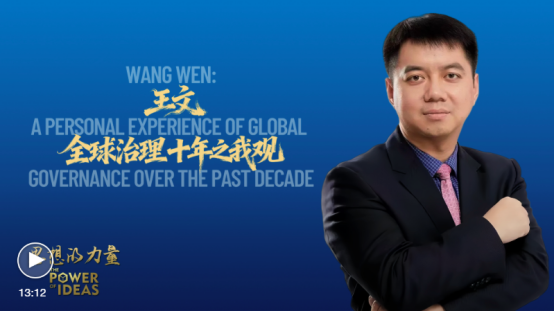LATEST INSIGHTS
Your Present Location: LATEST INSIGHTSSupport structure: The 80th anniversary of the founding of the UN is an opportune moment to revitalize its foundations
Support structure:
The 80th anniversary of the founding of the UN is an opportune moment to revitalize its foundations
Source: China Daily Global
By DARYL GUPPY
Updated: 2025-09-19 09:20

WANG XIAOYING/CHINA DAILY
The United Nations grew out of the global cooperation, which defeated fascism. It was conceived as a multilateral organization to deliver a global rules-based order.
These cooperation objectives are currently under the greatest threat in 80 years, and China has taken up the baton of global cooperation that has been dropped by some members of the UN.
China's resolute response to the imposition of unilateral sanctions that are destroying the global trading system provides a clarion call for cooperation and restoration of the global rules-based order promoted by the UN.
A series of China-advocated global initiatives show that China has moved to restore the original objectives of the UN by supporting multilateral solutions. China's words and deeds place the UN at the center of global governance where disputes are resolved through diplomatic means and dialogue.
These policy commitments recognize that a global rules-based order is built on cooperation, inclusion and multilateral decision-making. It is China that has worked with, and speaks for, the Global South to ensure that the views of the many, rather than just the dictates of a few, are heard.
China has promoted the collective interests of the Global South and contributed to the empowerment of all the developing countries with its constructive engagement in the UN.
One often overlooked example of China's determined support for global cooperation is its involvement in UN humanitarian programs and peacekeeping actions.
China is the second-largest funding contributor to international peacekeeping. China's manpower contributions are significant. Currently, there are about 1,800 Chinese military peacekeepers committed to seven UN peacekeeping missions. Since 1990, the person-times of Chinese peacekeeping personnel have surpassed 50,000. China is also actively involved in leading peace training workshops and seminars.
China's overseas activity in support of UN operations is regarded as a priority in its international relations policy. China's involvement in international humanitarian efforts requires cooperation with other governments and agencies, and this has greatly enhanced the way China works in the international environment.
China has increased its involvement in and support for the mechanisms of the UN at a time when some other UN members have remained mute in the face of attacks on the UN. China's involvement in UN activities has become more sophisticated, with broader and sustained support for the working divisions of the UN. China acknowledges that the UN is about much more than just trade and economics.
China's experience means it understands the role that health, education, hunger and poverty alleviation have to play in creating a stable and prosperous world.
The 80th anniversary of the founding of the UN tells the story of global governance delivering a global rules-based order that underpinned a prolonged period of stability. That order is under unprecedented threat today from those who reject the principles of global cooperation.
At times, UN rulings were begrudgingly accepted, and at times, honored more in the breach than in compliance. But the structure of cooperation was not seriously challenged.
That has changed with the application of the United States' unilateral sanctions and its choosing which UN resolutions it will accept or ignore. The US denial of visas to some UN representatives is an attack on the fundamental principles of the UN and global cooperation.
It is evident that the UN ought not to be abandoned and that the legacy of global cooperation created by the UN should be cherished and translated into a more comprehensive version.
The batons of global cooperation are slipping from the hands of certain UN members and it requires resolute action to take the leadership in restoring the cooperative multilateral approach to global governance. China has proposed several initiatives designed to support the functions of the UN and reaffirm its cooperative nature.
President Xi Jinping proposed the Global Development Initiative at the general debate of the 76th Session of the UN General Assembly in 2021, with a view to speeding up the implementation of the UN 2030 Agenda for Sustainable Development by the international community and achieving more robust, greener and more balanced global development.
Most recently, the Global Governance Initiative proposed by President Xi further demonstrates China's commitment to safeguarding the international system with the UN at its core. This is the fourth global initiative proposed by China after the Global Development Initiative, the Global Security Initiative and the Global Civilization Initiative.
China has stepped up support for the UN as the US has withdrawn from some UN institutions. These China-advocated global initiatives all affirm the cooperative and inclusive objectives that underpin the foundation of the UN. The four global initiatives, distinct in their focus on development, security, civilization and governance, collectively contribute to stability and predictability in an increasingly volatile world, showcasing China's leadership in international affairs.
The formal implementation of these initiatives can reinvigorate the role and relevance of the UN as it moves beyond its 80th anniversary, which is a suitable time to reaffirm the cooperative objectives of the UN and the role it plays in creating and sustaining a multilateral global order.
The author is an international financial technical analysis expert and a former national board member at the Australia China Business Council. The author contributed this article to China Watch, a think tank powered by China Daily.
Key Words: UN























































































 京公网安备 11010802037854号
京公网安备 11010802037854号





